The Hebrew Letter “Hei” and the two
Please Note: Firefox and some other search engines are not suitable
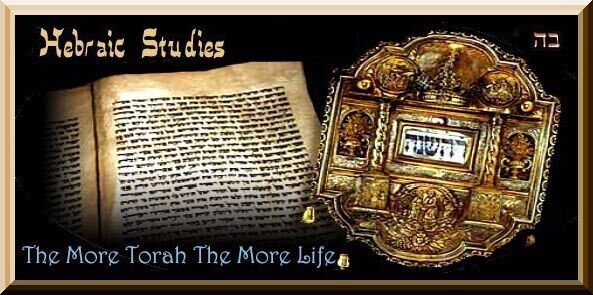
Please Note: On this page I may show the four
letter blessed *“Memorial
Name” of the Almighty in Ivrit - ![]() - Y-H-V-H, which we
usually pronounce as “Adonai” or “HaShem”.
At all times treat the most blessed Name with sanctity and when we even see the
Name, we should say “blessed be His Sanctified Name.”
- Y-H-V-H, which we
usually pronounce as “Adonai” or “HaShem”.
At all times treat the most blessed Name with sanctity and when we even see the
Name, we should say “blessed be His Sanctified Name.”
*“This is My Name forever,
and this is My memorial to all generations.”
Shemot - Exodus 3:15.
![]()
And the
With
![]() of hosts: Consider your ways. Go up to the
hill-country, and bring wood, and build the House (
of hosts: Consider your ways. Go up to the
hill-country, and bring wood, and build the House (![]() , saith
, saith ![]() ” Chaggai - Haggai
1:7-8 (JPS version of the
Tanakh).
” Chaggai - Haggai
1:7-8 (JPS version of the
Tanakh).
This study is about a time when the B’Nai Yisroel - Children of
Having returned to the city of
Here In this study we are going to discover that it is all based on how some Hebrew words are written in our wonderful Tanakh, for we must understand that NOTHING is in the Word of Elohim without a special reason!
Words can make meaning quite different to what we tend to assume at first, even though they may seem to say the same thing. But sadly, translators who translated the Tanakh and Bibles for that matter, in reality had little to no understanding of some of the true Hebrew inner thoughts and meanings of the Word. In addition you should note the three vital points.
1. Who was ![]()
2. When was it said?
3. How was His Word understood at the time it was spoken and given?
It was for those very reasons that certain translators and over zealous rabbis of old, who would argue with each other at the Yeshiva, or at Shul (Synagogue) and they missed some of the beauty and treasures found in the Tanakh and thus also a full understanding of the wonderful words therein. Thus many did not realise that some words they knew well were actually spelled a little differently, for there may be a letter missing which is what we are looking at in this study. Therefore, they simply used the same word, without any explanation of the difference of its meaning!
![]()
Let me explain the word “Glorified”:
The Hebrew word
“glorified” is ![]() - “kavda”
in Hebrew - Ivrit, and that is how it is written above in Chaggai
- Haggai chapter 1, verse 8, but it is noteworthy to note that the Hebrew
letter “Hei”
- “kavda”
in Hebrew - Ivrit, and that is how it is written above in Chaggai
- Haggai chapter 1, verse 8, but it is noteworthy to note that the Hebrew
letter “Hei” ![]() “h” was missing from the
original word (which is written like this
“h” was missing from the
original word (which is written like this ![]() ), but when
), but when ![]() is read, it actually sounds like the “Hei”
is read, it actually sounds like the “Hei” ![]() “h”
is there.
“h”
is there.
The sound of the “Hei”
![]() “h” is almost like a breath
at the end of a word, and it requires no effort, no movement of lip, tongue, or
mouth.
“h” is almost like a breath
at the end of a word, and it requires no effort, no movement of lip, tongue, or
mouth.
Yet, the letter “Hei”
![]() “h” is a very predominant
feature in the “Memorial Name” of Elohim for we should all know
that the Sanctified Name is frequently written in the Tanakh as “YAH”!
“h” is a very predominant
feature in the “Memorial Name” of Elohim for we should all know
that the Sanctified Name is frequently written in the Tanakh as “YAH”!
The letter Hei
“h” is also
important in many other names, for example it played a huge part in the life of
Avram - Abram, as we need to remember that he did not receive the “Hei” ![]() , the “h” until quite
some time latter in his life, for Elohim waited as Avram first had to become a
true man of faith! Then when the time was right
, the “h” until quite
some time latter in his life, for Elohim waited as Avram first had to become a
true man of faith! Then when the time was right ![]()
![]() “h” to his name and Avram
-
“h” to his name and Avram
- ![]() finally became Avraham
-
finally became Avraham
- ![]() !
!
But here is the BIG question; why was the
letter “Hei” ![]() “h” missing when
“h” missing when ![]()
The letter “h” ![]() is also the fifth letter in the Hebrew
Alphabet having the numeric value of five and again this number is vital in
relation to the
is also the fifth letter in the Hebrew
Alphabet having the numeric value of five and again this number is vital in
relation to the
Therefore we should understand that the missing
“Hei” ![]() represents five vital missing elements in
the
represents five vital missing elements in
the
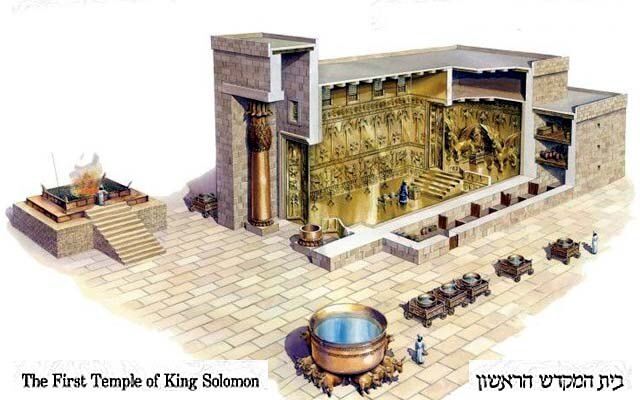
Here we
see the
These are the FIVE vital elements that were
missing:
![]()
2… The burning heavenly fire on the altar that remained alight permanently.
3… The Divine Spirit (presence) of
![]() Elohim!
Elohim!
4… Also missing was the Shechinah presence, Elohim’s Glory!
5… Breastplate
of the High Priest.
Second Temple
It was Zerubbabel who
led the first group of some 42,360 Hebrews, as they returned from their
Babylonian captivity in the first year of “
In 536 BCE, after the fall of
It was Zerubbabel who
led the first group of some 42,360 Hebrews, as they returned from their
Babylonian captivity in the first year of “
“In the second year of Darius the king, in the sixth month, in
the first day of the month came the word of ![]() by Haggai the prophet unto Ze’ru’balel
- Zerubbabel the son of Shalathiel - Shealtiel, governor of Yehudah - Judah, and to Yahushua -
by Haggai the prophet unto Ze’ru’balel
- Zerubbabel the son of Shalathiel - Shealtiel, governor of Yehudah - Judah, and to Yahushua -
‘Thus speaketh ![]() of hosts, saying: This people say: The time is
not come, the time that
of hosts, saying: This people say: The time is
not come, the time that ![]() ’s house should be
built.’ Then came the word of
’s house should be
built.’ Then came the word of ![]() by Haggai the prophet, saying: ‘Is
it a time for you yourselves to dwell in your ceiled (covered) houses, while
this (My) house lieth
waste?” Chaggai - Haggai 1:1-4 (JPS version of
the Tanakh, with Hebraic names added).
by Haggai the prophet, saying: ‘Is
it a time for you yourselves to dwell in your ceiled (covered) houses, while
this (My) house lieth
waste?” Chaggai - Haggai 1:1-4 (JPS version of
the Tanakh, with Hebraic names added).
Thus at the urging of the prophets Haggai and Zecharyah - Zechariah, with the assistance of Zerubbabel, the governor of Yehudah - Judah began the construction of the “Second Temple” in 521 B.C.E. The temple was completed around 515 B.C.E.
Although there is no known detailed plan of this
![]()
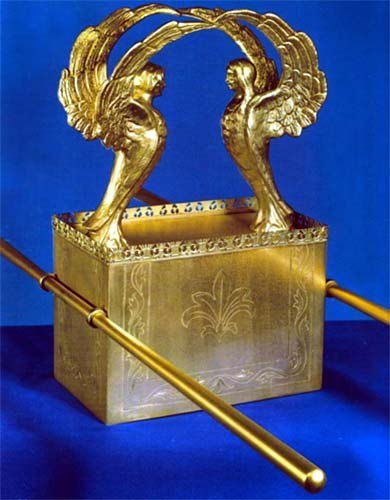
The most
faithful recreation of the “Ark of the
Covenant” done by experts in Yisroel -
We all know that upon completion of the ![]() - “Aron HaBerit” was
placed in the Holy of Holies.
- “Aron HaBerit” was
placed in the Holy of Holies.
However, even without the blessed “
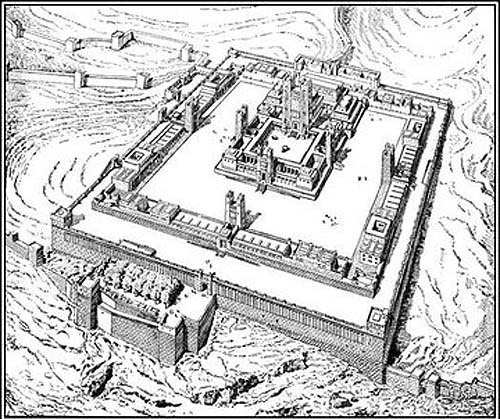
![]()
Regarding the Ark
However, during the reign of Nebuchadnezzar
his army came and plundered the
Thus the “Ark of the Covenant”
also referred to as the “footstool” of Elohim, disappeared from
history after
There was no further mention of the “Ark of the Covenant” upon the return of the Israelites from their Babylonian captivity.
In Yechezkel - Ezekiel Chapter 10 verses 4 to
18 it is revealed that
![]() mounted up from the cherub to the threshold of
the house; and the house was filled with the cloud … And the glory of
mounted up from the cherub to the threshold of
the house; and the house was filled with the cloud … And the glory of ![]() went forth from off the threshold of the
house, and stood over the cherubim” Yechezkel - Ezekiel 10:4 & 18
(JPS).
went forth from off the threshold of the
house, and stood over the cherubim” Yechezkel - Ezekiel 10:4 & 18
(JPS).
Thus the “Glory of ![]() mounted (rose) up” and it departed from
the
mounted (rose) up” and it departed from
the
The other allusion to the
“He (![]() )
hath cast down from heaven unto the earth the beauty of
)
hath cast down from heaven unto the earth the beauty of
Thus the “footstool” of Elohim was taken away by the cherubim and it would be now located in Heaven.
![]()
What about the Temple Har Ha’Moriyah Mount Moriah Roman
You will be surprised what I will now be
telling you, for what we tend to call the
“In the 18th year of his reign, Herod decided to rebuild the Temple, and in order to allay the fears of the people and avoid their wrath, he completed all the preparations for the new building (Temple), before demolishing the existing structure (the previous Second Temple)” - “Direct quote from ‘Encyclopaedia Judaica’ on the Temple with two explanations added in brackets.
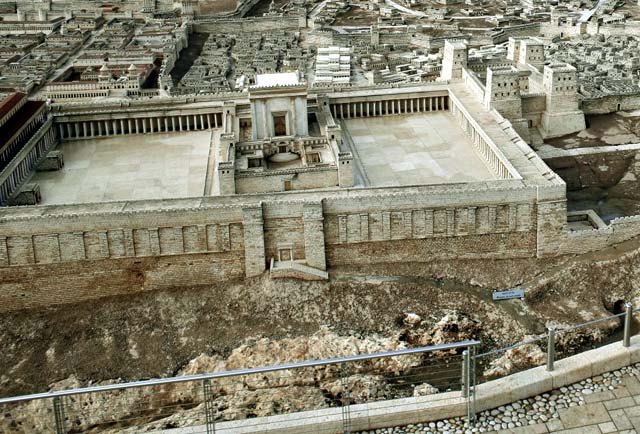
![]() “kavda”
was used the letter “Hei”
“kavda”
was used the letter “Hei” ![]() “h” would be missing, and
thus therefore the precious “Shechinah
presence” or “Elohim’s Glory” was missing in them. But
thankfully, the day will come in the future our Mashiach will come and then a
“h” would be missing, and
thus therefore the precious “Shechinah
presence” or “Elohim’s Glory” was missing in them. But
thankfully, the day will come in the future our Mashiach will come and then a
![]()
![]() Elohim, blessed be His Sanctified Name, is the
one who gave us our Life!”
Elohim, blessed be His Sanctified Name, is the
one who gave us our Life!”
![]()
Return to our MAIN PAGE or go to
our Main Index



